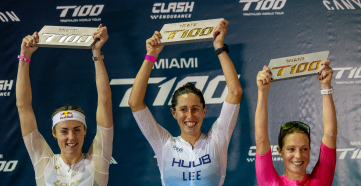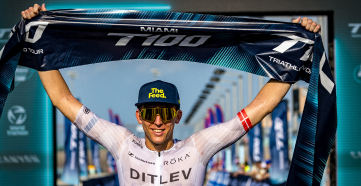To mark International Women’s Day 2021, the Professional Triathletes Organisation celebrates the way its athletes fight, and triumph, against adversity.
The PTO has actively championed the growth of women’s triathlon, with equality from a prize money and a participation perspective. It is a goal which many were already fighting for.
Six years have passed since #50womentokona became a call to action, demanding equal slots for women at the IRONMAN World Championship. Much work has since been done, and many improvements have been made.
More money is now specifically earmarked for women in the sport, while better resources are now available. The growth of women’s triathlon at collegiate level in the U.S. is another highly promising sign.
The journey is not yet over though. While the number of women participating in triathlon has increased, the balance has not yet been adequately redressed. The story is still only just beginning.
The PTO has a total commitment to gender equality, a commitment to provide women with exactly the same earning opportunities as men. Its recent maternity leave policy also seeks to allow women to more easily balance a career as a professional triathlete with motherhood.
So many of our PTO women athletes have inspiring back stories which should be shared and celebrated, especially today. We spoke to three of them, and they are three of many.
Angela Naeth, Els Visser and Renee Kiley joined us to discuss the battles they have faced, and how they fought through the hardest of times to become elite athletes and examples of true role models.

‘Keep. Moving. Forward’ – Angela’s Story
Twenty-hour training weeks, eight-hour races, ensuring your body is in peak physical and mental condition to compete at the highest level – elite triathlon is not for the faint-hearted.
Imagine all that, and then throw a chronic infection into the mix.
Angela Naeth was first diagnosed with Lyme Disease in 2018 with a co-infection of Bartonella.
The bacteria can induce a series of symptoms including regional adenopathy, though it can also cause fever and, more rarely, eye disorders, or infections of the liver, spleen, or bones.
Some may also develop neurological involvement including encephalopathy, myelitis, and cranial neuritis/renitis.
In short, extremely debilitating for anybody to deal with. For an elite athlete, utterly devastating.
“I was first diagnosed with Lyme Disease in 2018,” Angela explained in a PTO video interview to mark International Women’s Day 2021.
“What I thought was Lyme Disease was actually a Bartonella infection, which is a bacterial infection that really effects your bodies whole system.”
“It has taken two and a half years to treat, I go through ups and downs, but it is very tough.”
Relapses are common for Angela as she continues her fight with the chronic ailment. Even when she is feeling on the top of her game, in the back of the mind she knows the danger is still there.
“Throughout the last couple of years, I have gone through relapses where I thought I was healthy, got off some antibiotics and the bacterial infection was still there, so I am continuing to treat and it’s continually an adversity I have to overcome.
“I’m on a really good path of treatment and I am excited to see what the year brings.”
Since diagnosis, Angela has followed a three-word motto to help her get through the tough times, words we can all adopt to help us achieve our goals.
“Keep moving forward – those three words set me on a path to achieve the best I could with what I had every single day.
“That’s how overcame it, that exact mindset. I woke up and if I was able to jog to the next street that was my goal for the day.
“Every little day was baby steps that finally got me to a race, which finally got me to a race I could finish, which finally got me to a race where I could achieve something great.
“It has taught me a lot, it’s taught me to never give up, it’s taught me that you are going to fall down, and you just have to get up again.”

‘I really believed I was going to die’ – Els’ Story
In 2014, Els Visser was studying for PhD in surgery and travelling the globe to study in various places in the world. She had no idea the most traumatic experience of her life was about to occur.
Travelling on a boat in Indonesia along with 24 other people, the boat began to sink and soon Els was left clinging to the stricken wreckage in the ocean.
With no rescue operation in sight, the Netherlands native swam for eight hours to reach a nearby island before she was eventually rescued by a passing boat.
“I really believed I was going to die,” she said.
“Luckily, rescue did come, and I got another opportunity to live my life. But when I got home to Holland, I was traumatised, it felt strange to live my normal life again – being a student and continuing my medical studies – it still felt like I had to fight to survive.”
The emotional impact of the shipwreck outlasted the physical reminders of the ordeal, but Els’ love of sport, as well as speaking about her experience with friends and family, helped her through the darkest of times.
She explained: “I took up running and found a love of sports. After a stressful day working in a hospital, running really helped me to relax and clear my mind.
“My feelings of anxiety reduced, and my sleep improved. I enjoyed this new lifestyle.”
The healing journey had now begun, though little did Els know at that stage how far it would take her.
“After experiencing the power of the human body and mind, I decided to challenge myself in sports. A 5km run became a 10km run, then a half-marathon, then a marathon.
“And then in 2016 I found the love of triathlon. I decided I wanted to compete in a full-distance race.
“Now, I try to live my life to the fullest and make the most of it.”

‘104kg, smoking a pack a day’ – Renee’s Story
When Renee Kiley went to watch a triathlon with her friends in 2013, the Australian was overweight and working 12-hour days. A lifestyle about as unhealthy as it gets.
“I was 104kg, smoking a packet of cigarettes a day, the owner of multiple successful businesses and working 60-70 hours a week.
“I hadn’t exercised in over 15 years; my blood pressure was 141/110 – I was clinically obese.”
“I was extremely unhealthy, and despite the façade I put, on I was very unhappy.”
That moment in 2013 though, as she watched triathlon from the sidelines, turned her life around.
Soon after, she began training for a sprint triathlon and almost instantly fell in love with the sport.
“It completely turned my life around. Triathlon was the catalyst for me losing 44kg throughout that year, quitting smoking and finding happiness again.”
What started out as a fun hobby for Renee soon became a lifestyle, a career path and her route to happiness.
“I really started triathlon for fun, then after a few years I was good enough to earn my professional license. I stepped away from my office job in 2018, and now triathlon is my full-time job.
“I started a completely new career in my 30s. I’m competing with the best women in the world in triathlon – Olympians, World Champions. Who would have thought with my background that it would be possible?
“It shouldn’t have been possible, but that is the power and beauty of sport.”
Now Renee hopes to inspire other women to pursue their goals, and to live a happy and healthy lifestyle to boot.
“A big part of what drives me is inspiring others – particularly women. I am proof it is never too late to change your life.
“Just one small decision to get started can lead to a multitude of opportunities in life that right now you couldn’t even dream of.
“I love that in the sport of triathlon I feel equal to men, we compete over the same distances, for the same prize money and I love the challenge of finishing as close to the men as possible.
“It’s so exciting to see the gaps closing.”

















